Why Some Guinea Pig Breeds Are More Vocal Than Others
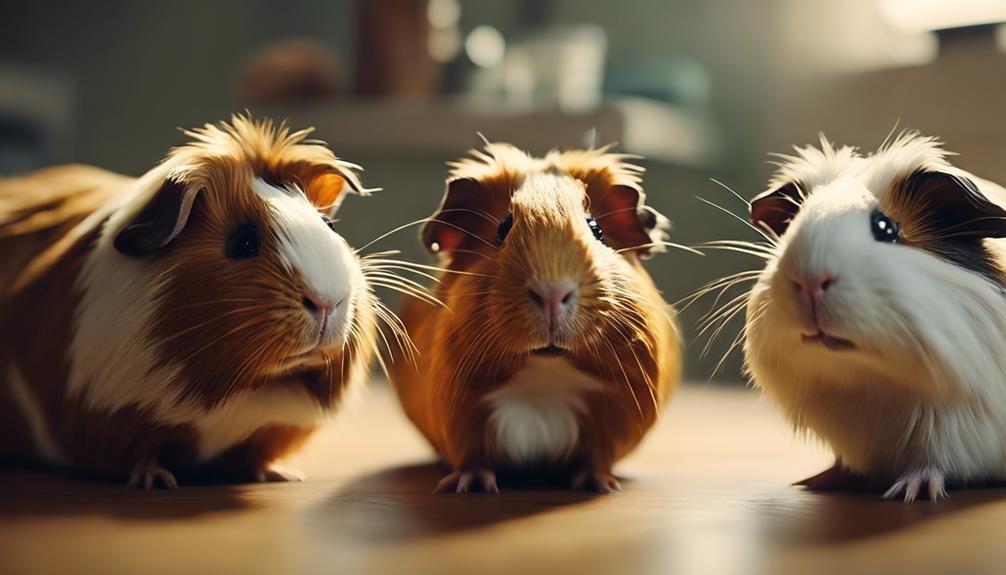
These breeds, such as the American and Teddy guinea pigs, tend to be more talkative and expressive compared to others.
Their vocalizations can vary in pitch, duration, and intensity, serving different purposes such as expressing excitement, fear, or hunger.
Understanding these breed-specific traits can help guinea pig owners better interpret and respond to their pets' needs and emotions.
Genetic Factors in Vocalization
Genetic factors significantly influence the vocalization characteristics observed in various guinea pig breeds. Within guinea pig populations, certain breeds may possess inherited traits that predispose them to be more vocally expressive than others. Through selective breeding practices, some breeds have been specifically bred for increased vocalization, leading to distinct differences in their vocal tendencies compared to other breeds. These genetic variations play a crucial role in shaping the frequency and intensity of vocalizations exhibited by different guinea pig breeds.
Understanding the genetic basis of vocalization in guinea pigs provides valuable insights into why some breeds are inherently more vocal than others. By studying the underlying genetic factors that contribute to vocal traits, researchers can unravel the complex interplay between genetics and vocal behavior in guinea pig populations. This knowledge not only sheds light on the natural diversity of vocalization tendencies among guinea pig breeds but also highlights the intricate relationship between inherited traits and vocal expressions in these adorable pets.
Breed-Specific Vocal Traits
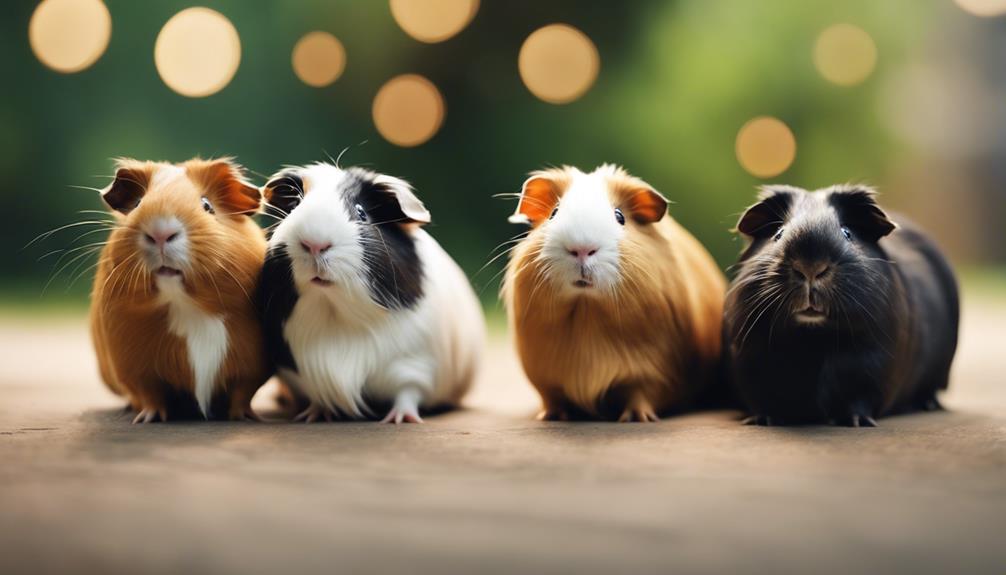
Among guinea pig breeds, distinct vocal traits are observed, reflecting a combination of inherent characteristics and genetic predispositions. Different breeds exhibit unique vocalizations influenced by factors like coat type and individual temperament. The table below highlights some breed-specific vocal traits based on genetic predispositions and coat types:
| Breed | Vocalization Characteristics | Genetic Predispositions | Coat Type |
|---|---|---|---|
| Abyssinians | Loud and frequent vocalizations | Genetic predisposition | Short hair |
| Peruvians | Softer vocalizations compared to other breeds | Genetic predisposition | Long hair |
| Skinny pigs | Increased vocalizations, possibly due to vulnerability | Genetic predisposition | Hairless |
These traits suggest that breed-specific vocalizations in guinea pigs are not only influenced by genetic factors but also by physical characteristics such as coat type. Understanding these differences can provide valuable insights into the communication patterns of different guinea pig breeds.
Environmental Influences on Communication
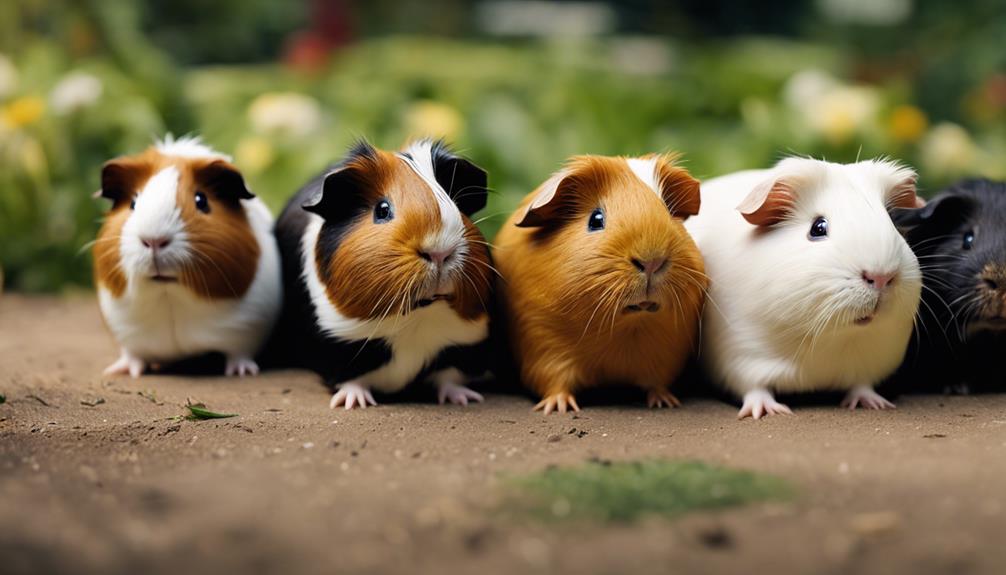
Environmental factors play a crucial role in shaping the vocal communication behavior of guinea pigs. Various aspects of the environment, such as cage size, social interactions, and stress levels, can significantly influence the vocalizations of these small animals. Guinea pig breeds that inhabit noisy or busy environments may adapt by increasing their vocalizations to effectively communicate with their companions. Conversely, a lack of enrichment, such as toys or hiding spots, can lead to heightened vocalizations as a way for guinea pigs to seek stimulation and alleviate boredom.
Moreover, social interactions play a vital role in determining the vocal patterns of guinea pigs. Social isolation or limited interaction with humans and other guinea pigs can result in increased vocalizations as a means to seek attention or companionship. Additionally, changes in the environment, routine, or caregiver interactions can impact the stress levels of guinea pigs, potentially leading to alterations in their vocalization patterns. These environmental influences contribute to why some guinea pig breeds are more vocal than others.
Behavioral Differences in Vocalization
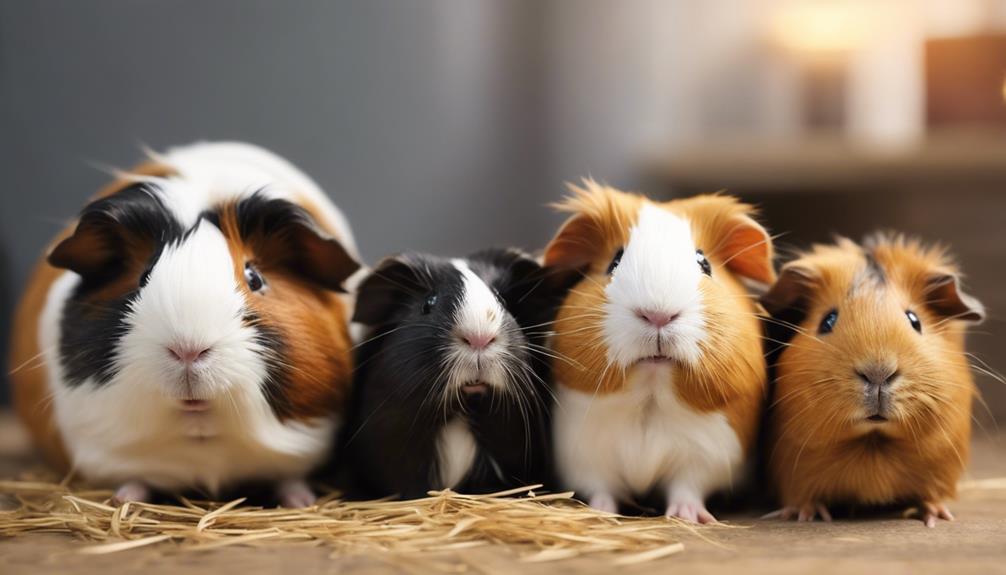
Examining the behavioral intricacies of vocalization in guinea pig breeds reveals distinct patterns influenced by breed characteristics and social dynamics.
Different guinea pig breeds exhibit varying levels of vocalization due to genetic predispositions. Breed-specific traits such as temperament and social needs play a significant role in determining vocalization behavior. Quiet breeds like the American or Silkie tend to vocalize less compared to more vocal breeds like the Abyssinian or Texel. Variations in vocalization frequency and intensity can be attributed to the unique personalities of each breed. Understanding these breed-specific vocalization patterns is crucial for catering to the individual needs and preferences of guinea pig breeds.
Social Interaction and Vocalization
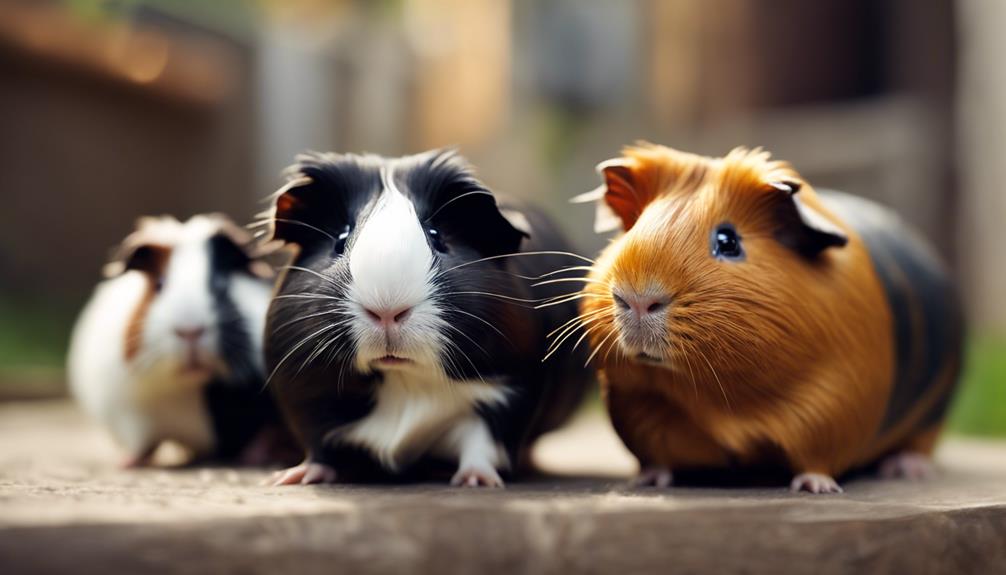
Socially interactive guinea pig breeds like the American and Abyssinian tend to exhibit higher levels of vocalization compared to their more reserved counterparts. These breeds, known for their sociable nature, thrive on social interactions within their groups.
Guinea pigs are social animals that use a variety of sounds and body language to communicate with each other. More vocal breeds often engage in frequent chirping, purring, and squealing to express their emotions and maintain contact with their companions. In contrast, breeds like the Peruvian and Teddy guinea pigs, which are more independent and reserved, may exhibit less vocalization due to their lower need for constant communication with others.
Understanding the link between social interaction and vocalization in guinea pigs is crucial for owners to meet their pets' communication needs adequately. By recognizing the communication preferences of different breeds and responding appropriately, owners can strengthen their bond with their guinea pigs and ensure their overall well-being. Genetic factors also play a role in determining vocalization levels among guinea pig breeds, with some naturally inclined to be more talkative and expressive than others.
Health and Vocalization in Guinea Pigs
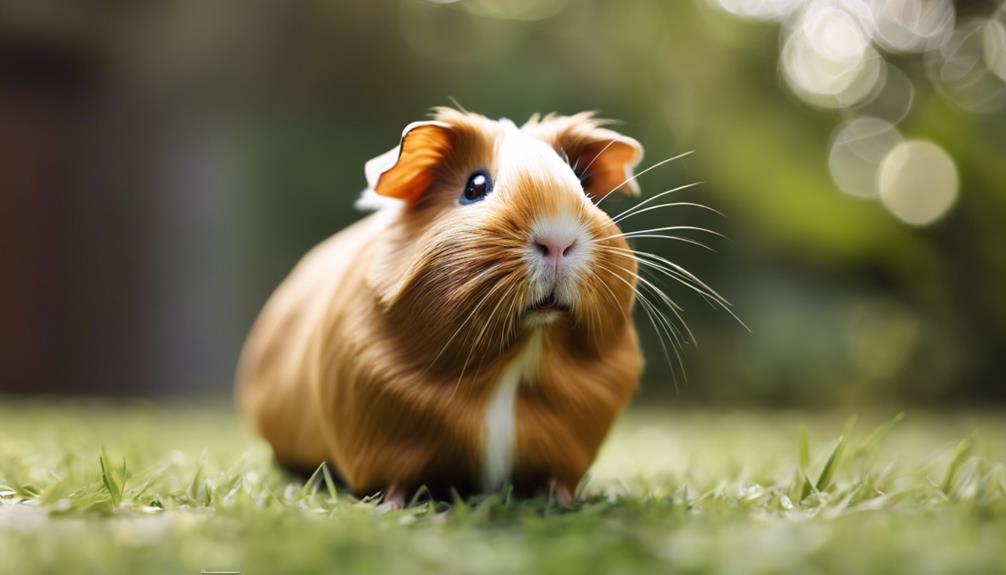
In guinea pigs, changes in vocalization patterns can serve as crucial indicators of underlying health issues that necessitate veterinary attention. Guinea pigs make sounds that are typically associated with their well-being, and understanding these vocalizations is essential for maintaining their health.
Here are some key points to consider regarding animal health and vocalization in guinea pigs:
- Unusual Sounds: Keep an ear out for abnormal sounds like wheezing, coughing, or labored breathing, as these can be signs of respiratory problems in guinea pigs.
- Abnormal Vocalizations: Any clicking, hooting, or crackling noises should be promptly addressed by a guinea pig-savvy veterinarian to ensure the well-being of the animal.
- Monitoring Changes: Regularly monitor your guinea pig's vocalizations for any new or concerning sounds, as this can aid in the early detection of potential health issues.
- Seeking Professional Help: If unsure about a guinea pig's vocalizations, seeking guidance from guinea pig forums or resources can provide valuable insights into interpreting and addressing health-related concerns.
- Early Detection: Early intervention based on vocalization changes can significantly impact the overall health and longevity of guinea pigs.
Training and Managing Vocalization
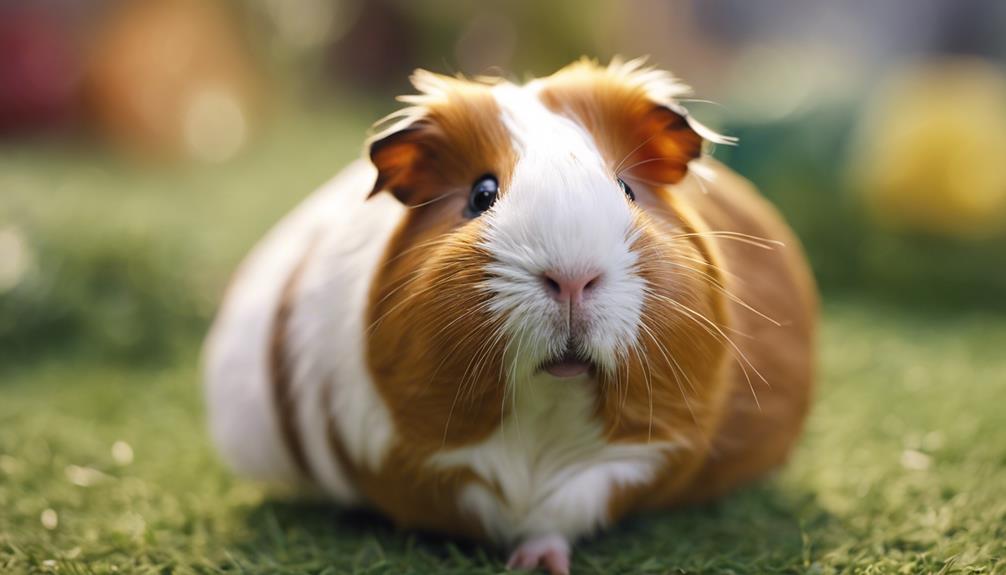
Implementing training techniques can effectively assist in managing and modifying vocalization behaviors in guinea pigs. Positive reinforcement methods, such as rewarding desired vocalizations with treats or attention, can encourage the behavior you want to see. Consistent handling and socialization are crucial in regulating vocalizations, as guinea pigs that feel secure and comfortable are less likely to exhibit excessive vocalizations. Understanding each guinea pig's unique personality and preferences can also help in managing their vocalizations effectively. Providing a stimulating environment with hiding spots, toys, and opportunities for exercise can reduce stress and boredom, leading to fewer unnecessary vocalizations. By combining training, positive reinforcement, socialization, and environmental enrichment, guinea pig owners can create a harmonious living space for their pets while promoting desirable vocalization behaviors.
| Training Techniques | Benefits |
|---|---|
| Positive Reinforcement | Encourages desired vocalizations |
| Consistent Handling | Regulates vocalizations |
| Understanding Preferences | Helps manage vocalizations |
| Providing Enrichment | Reduces excessive vocalizations |
| Socialization | Aids in vocalization management |
Frequently Asked Questions
Are Some Guinea Pigs More Vocal Than Others?
Some guinea pigs exhibit more vocalization than others. Breeds comparison reveals variations in vocal patterns due to genetic predispositions and environmental influences. These factors, along with individual personalities, contribute to the diverse vocal behaviors observed among guinea pig breeds.
Why Is My Guinea Pig so Talkative?
Some guinea pigs are quite talkative due to a combination of genetic predisposition, environmental factors, and social interactions. Training methods and a suitable environment can help manage their vocal tendencies while fostering positive interactions.
What Does It Mean When a Guinea Pig Makes a Lot of Noise?
When a guinea pig makes a lot of noise, it can indicate various things. Communication cues, stress indicators, social interactions, and environmental factors all play a role in their vocalizations. Understanding these signals is crucial for proper care.
Why Is My Baby Guinea Pig so Vocal?
Baby guinea pigs are vocal to communicate their needs and seek reassurance from caregivers. Understanding their vocalization patterns, responding with care, and providing companionship can foster a strong bond and sense of security.











